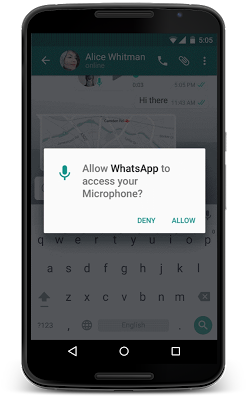At the Google I/O event in San Francisco, the company announced a number of changes to its Android mobile operating system, including the option to deny any app individual permissions.
As confirmed by the Android Developers Blog, in Android M, permissions will appear onscreen from an app as and when they're required. In an example courtesy of the official blog entry, Whatsapp would not ask for microphone permission until it is required to add functionality:

Android M will even allow you to sort all of your apps by the permissions they need access to, allowing you to see every app that requires microphone access, for example.
The idea behind this is so that users will understand the permissions they're allowing when presented in context, preventing people from backing out of downloads if alarmed by the reach of an app on the Google Play download screen.
Tech Crunch reports that while developers who fail to update their apps for Android M will still use the old permission model, they will have to modify their apps to allow for 'more granular permissions.' "No matter whether developers update their apps or not, users will be able to change every aspect of their permissions in the Android settings menu," the piece explains.
While Android M is available in Developer Preview build now, the full release isn't expected until the third quarter of 2015. In the meantime, you can read more about what app permissions to be wary of elsewhere on We Live Security.
This isn't the only security development in the Android update, either. Android has been rumored to be getting a fingerprint API for some time, but this has now been officially confirmed. While certain Android phones had their own fingerprint scanners, this perviously had to be added to the OS by each manufacturer. Android M will be the first version to have the functionality at system-level. Google promises that this will support unlocking handsets and authorizing of payments.




